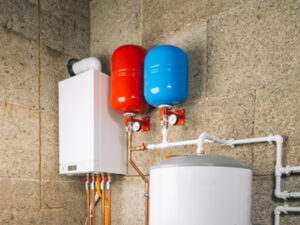Troubleshooting Water Heater Leaking
A leaking water heater can be a huge hassle and cause potential damage to your home. It is important to identify the source of the leak quickly so that you can minimize any further damage or costs associated with it. In this article, we will discuss some of the common causes of water heater leaking and what you should do when you find one in your home. We’ll also provide troubleshooting tips on how to identify and fix the problem quickly so that you can get back to enjoying hot showers or baths!

The first step in troubleshooting a leaking water heater is to identify the source of the leak. Look for any visible signs of damage, such as cracks or rust on the tank, or check for any wet spots around the base of the unit. If you cannot visibly identify where the leak is coming from, try running some cold water through the system and then checking for wet spots again.
Once you have identified where your water heater is leaking from, it’s important to take action quickly. Depending on how severe the leak is, you may be able to repair it yourself with a few simple tools and some DIY know-how. However, if the problem appears more serious or complex, it is best to contact a professional plumber to diagnose and repair the issue.
With a little bit of troubleshooting, you can quickly identify and fix any leaks in your water heater. And with these tips, you’ll be able to get back to hot showers in no time! Remember though, it is always best to contact a professional if you are not comfortable handling the repair yourself. They will have the experience and expertise needed to properly diagnose and repair the problem safely and efficiently.
Common causes of water heater leaks can be attributed to a few different factors. In many cases, the leak is caused by a crack in the tank or pipes leading to the unit. This can be due to corrosion or other wear and tear on the components, but can also be caused by sudden fluctuations in pressure or temperature, such as when you are filling up your hot water tank from an outside source. Additionally, if your water heater is over 8-10 years old, it may just be reaching its natural lifespan and is ready for replacement.
In some cases, a leaking water heater may also be caused by an accumulation of sediment over time. When sediment builds up at the bottom of your hot water tank, it can create an uneven surface that causes it to become more prone to cracking and leaking. In addition to checking for visible signs of damage around the base of your unit, you should periodically check for any signs of sediment buildup to prevent future problems with your water heater.
Finally, another common cause of a leaking water heater is loose connection points between the pipes and fittings that make up the plumbing system leading into and out of the unit. If any fitting becomes loose or detached, this can result in a leaky connection which will then cause your hot water tank to start dripping or spraying from either end. To prevent this issue from occurring, it is important to inspect all connecting points regularly so that any potential issues are caught early on before they become major problems.
https://www.google.com/maps?cid=12977601717463036516
